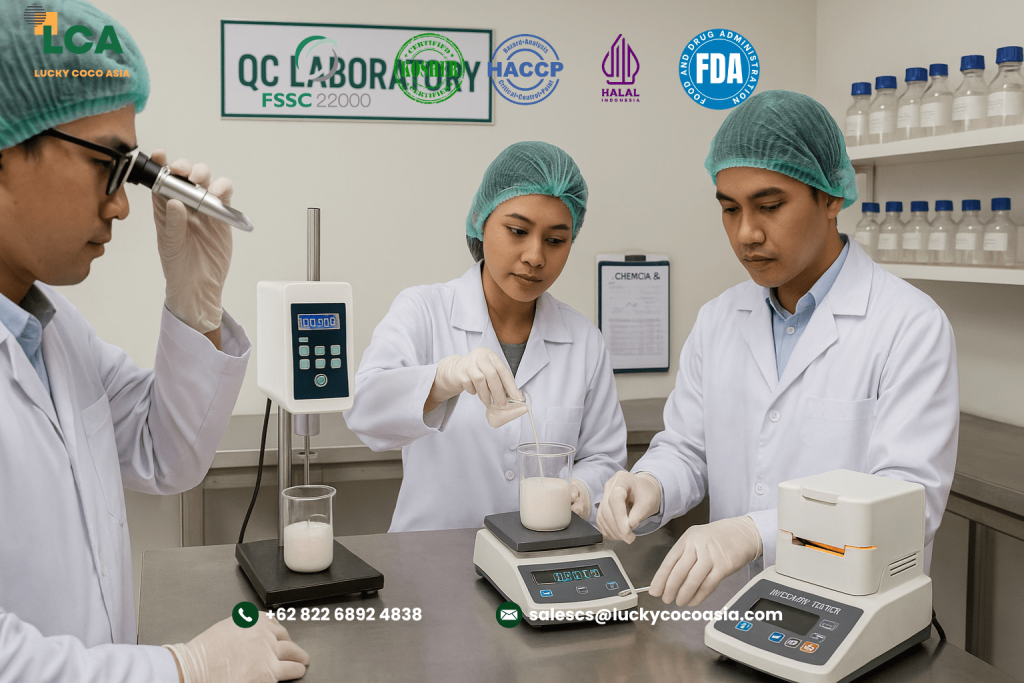Coconut Cream Certification Europe – Buyer Checklist

The Shift Toward Responsible Sourcing
Coconut Cream Certification Europe – In Europe, coconut-based ingredients are more popular than ever. However, price is no longer the main concern. Importers now value sustainability, traceability, and certified production. These elements show professionalism and reliability.
As a result, many buyers only work with suppliers that meet coconut cream certification Europe requirements. This ensures products are safe, consistent, and produced with transparent methods.
Why Coconut Cream Certification Europe Matters
For European buyers, certification is proof of commitment. It demonstrates that a supplier meets food-safety standards and follows controlled procedures. Therefore, importers can trust that every batch of coconut cream is handled with care and precision.
For exporters, certification brings clear benefits. It builds credibility, simplifies customs clearance, and opens access to new markets. Achieving coconut cream certification Europe means joining a network of trusted suppliers recognized across the EU.
Core Food-Safety Standards
To qualify under coconut cream certification Europe, exporters must comply with international food-safety systems. These standards ensure safe processing and consistent quality.
Lucky Coco Asia is certified by FSSC 22000, Halal, Kosher, and FDA. Each certification supports our promise of quality. For instance, FSSC 22000 guarantees strict hygiene, while Halal and Kosher certification broaden acceptance across diverse markets. Moreover, FDA registration confirms that our products follow global manufacturing safety requirements.
Sustainability and Social Impact
Sustainability is no longer optional. European importers want partners who operate responsibly and think long-term.
At Lucky Coco Asia, sustainability begins at the source. We support over 2,100 farmers through fair trade and regular training. We also use coconut husk biomass to generate clean energy, which reduces emissions and waste. Furthermore, we work continuously to improve water and energy efficiency.
These efforts align perfectly with coconut cream certification Europe, which values ethical sourcing and environmental care as much as product quality.

Traceability — A Core Part of Coconut Cream Certification Europe
Traceability brings confidence to every transaction. European buyers want to know exactly where each shipment originates.
To meet this need, Lucky Coco Asia provides complete transparency. Every export batch has a unique COA and lot record. The coconuts come only from verified plantations in North Sumatra and North Sulawesi. In addition, all steps — from collection to packing — follow a controlled chain of custody. Moreover, we also have ISO 17025 standard In-house lab for daily basis quality checks.
Because of this, our partners can easily verify origin and quality. This reliability strengthens compliance with coconut cream certification Europe.
Documentation and Labeling for EU Imports
Complying with coconut cream certification Europe also means following EU labeling rules. According to Regulation (EU) No 1169/2011, each shipment must show product name, fat content, batch number, production date, shelf life, storage instructions, and allergen information.
Lucky Coco Asia uses export-ready formats such as 20 kg aseptic Bag-in-Box and 200 kg Aseptic Flexbox Drums. These options reduce contamination risk and extend shelf life. Therefore, importers receive clean, safe, and easy-to-handle packaging. (Read also: 200kg Aseptic Flexbox Coconut Cream: A Better Alternative to Steel Drums)
Certifications That Build Trust with European Buyers
| Certification | Relevance to European Buyers |
|---|---|
| FSSC 22000 / HACCP | Confirms food-safety management compliance |
| Halal / Kosher | Expands market reach in EU foodservice |
| FDA Registration | Demonstrates global regulatory compliance |
| COA + TDS + Batch Reports | Supports traceability and audit requirements |
Presenting these documents early in negotiation builds confidence and reduces delays. Importers appreciate suppliers who prepare everything according to coconut cream certification Europe standards.
How Lucky Coco Asia Meets European Standards
Lucky Coco Asia integrates certification, sustainability, and traceability into one transparent system. We manage every stage — from farm to container — under the same controls. In addition, all exports include COA, TDS, and batch codes for full documentation.
Because of these practices, we maintain strong relationships with buyers across Germany, France, the UK, Spain, and the Netherlands. Therefore, when customers choose Lucky Coco Asia, they gain a reliable and compliant partner. (Read also: Coconut Cream Supplier for Europe – Certified & Export Ready)
The Future of Coconut Cream Certification Europe
Europe’s food industry is moving toward clean-label, plant-based products. Consequently, coconut cream certification Europe will become even more critical. Suppliers that combine safety, sustainability, and transparency will lead this transformation.
Lucky Coco Asia stands ready to meet this challenge. We offer premium coconut cream backed by verified standards and responsible sourcing. In every shipment, we deliver what European buyers value most — safety, reliability, and trust.
Partner with Lucky Coco Asia
If you’re a European food manufacturer, importer, or distributor looking for a reliable source of sustainable and certified coconut cream, contact us today to discuss customized fat-content solutions and bulk packaging options. (Contact Us here)

